Many people woke up this morning to news of overnight missile strikes launched by Iran against Israel, marking a serious escalation in the already tense situation in the region. Here’s what we know so far:
In the early hours of 1 October 2024, around 200 missiles were fired from various sites within Iran, targeting military and strategic locations across Israel. The missile strikes, carried out by the Islamic Revolutionary Guard Corps (IRGC), were reportedly in retaliation for the recent assassinations of key Iranian-backed figures, including Hezbollah leader Hassan Nasrallah and Hamas commander Ismail Haniyeh. Iran has codenamed this operation “True Promise 2.”
The Strikes
The missiles were launched with the intent to hit Israeli military infrastructure. According to Iranian state media, the strikes were a direct response to recent Israeli operations in Lebanon and the targeted killings of senior commanders. While Israel’s missile defence systems intercepted a large number of the incoming missiles, several fragments still caused damage on the ground. Among the casualties was a Palestinian civilian who was killed by falling debris, while two Israeli civilians and two Jordanians sustained injuries from shrapnel.
Israeli Response
In the wake of the strikes, Israeli Prime Minister Benjamin Netanyahu addressed the nation, stating that Iran had made a “grave mistake” and vowed that Israel would respond. The Israeli military confirmed that they had intercepted a significant portion of the missiles and that preparations were being made for potential retaliatory action.
The United States also quickly condemned the strikes, with the Pentagon confirming that U.S. naval forces in the region assisted Israel by launching missile interceptors. The U.S. National Security Advisor warned that Iran would face serious consequences for the attack, reaffirming America’s commitment to supporting Israel. Meanwhile, Jordan, which also came under threat, reported that its air defence systems successfully intercepted missiles and drones in its airspace.
Regional Impact
This attack marks a major escalation in the already tense situation between Iran and Israel. In recent months, hostilities have been rising, particularly after Israeli airstrikes targeted Hezbollah positions in Lebanon. The killing of Nasrallah, along with other key figures, has been seen as a significant blow to Iran’s influence in the region, and these missile strikes appear to be Iran’s response.
The situation has prompted Israel and Jordan to temporarily close their airspace, leading to disruptions in international flights. Airlines have been rerouting planes to avoid the region, and there is a palpable sense of uncertainty over what could come next.
International Reaction
Governments around the world have been quick to respond to the escalation. European Union officials have condemned the missile strikes and reiterated their commitment to Israeli security. In the United Kingdom, Prime Minister Keir Starmer called Iran’s actions a “reckless provocation,†while France’s President Emmanuel Macron reaffirmed his country’s support for regional stability, noting that French forces in the Middle East were prepared to respond to further threats.
Meanwhile, in Iran and parts of Gaza, crowds have taken to the streets in celebration, waving flags and holding portraits of the leaders who were killed. Iranian state media has praised the missile strikes as a major victory, while in Israel, people are bracing for potential retaliatory action.
What’s Next?
As the situation continues to develop, the possibility of further escalation remains high. Israel has indicated that a military response is likely, which could see renewed airstrikes targeting Iranian interests in the region. While Israel has previously conducted strikes against Iranian-backed forces in Syria and Lebanon, direct strikes on Iran itself could mark a dangerous new phase in this conflict.
For now, both sides appear to be preparing for what might come next, and the international community is watching closely. The risk of a broader conflict remains, and any further military actions could have far-reaching consequences, not just for Israel and Iran, but for the stability of the wider region.
As tensions simmer, there’s a sense of uncertainty about what the next few days might bring.


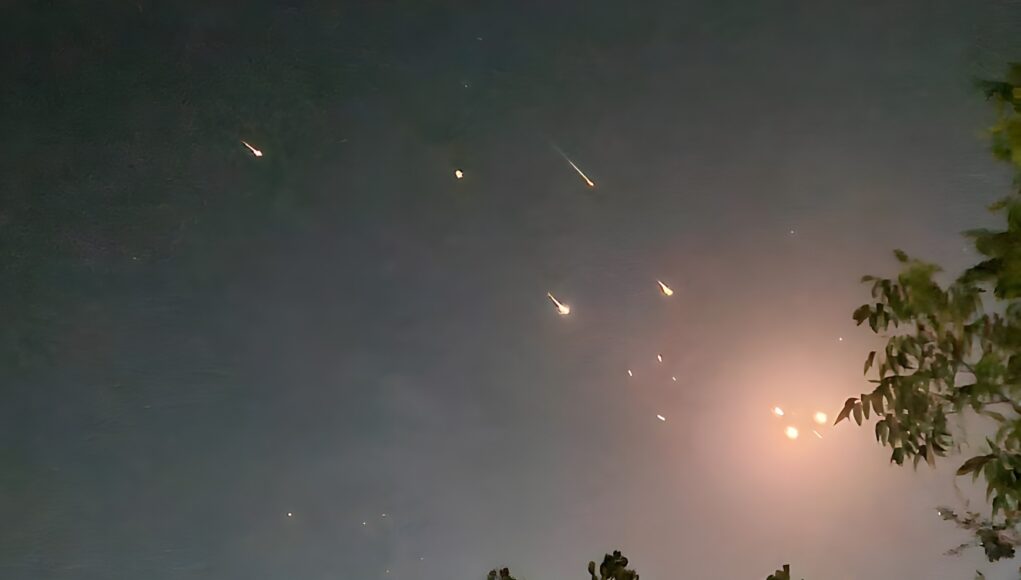
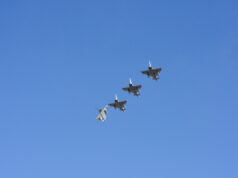
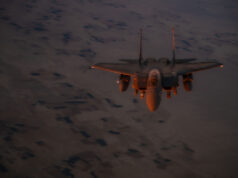
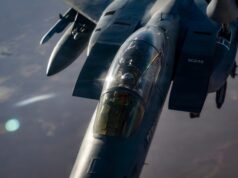


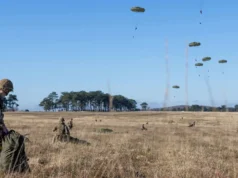



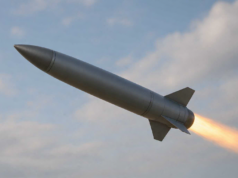

I’m dissapointed UKDF, you’re supposed to be truthful yet you’re claiming it was fragments that hit Israel? if you look at footage it’s clearly ballistic missiles that impact without being intercepted, you can also see interceptions, but they don’t intercept enough. Please don’t make false claims, if Iran has achieved impacts then we need to be truthful about it.
Who is UKDF? Also, did you even read the article?
I did, and you highlight that fragments passed through.
” While Israel’s missile defence systems intercepted a large number of the incoming missiles, several fragments still caused damage on the ground.”
Yup, that’s how I see it too.
United Kingdom Defence Farce ?
Nothing untrue has been asserted here. The number of impacts and damage is yet to be reported. ATM it looks like the majority of Iran’s missiles were intercepted
OSINT has and will be instrumental in confirming impacts, Israel is unlikely to be truthful regarding impacts and their effect so waiting for them to confirm damage to military infrastructure for example, won’t yield much.
Don’t expect the truth from Iran either, they are already claiming 90% of the missiles hit their targets. They can’t possibly know right now.
Of course, the goal here was not to hold Iran here as a beacon of truth, it isn’t. Rather to ensure that people aren’t interpreting the attack as “fragments of iranian missiles hitting the ground”, which is largely what Israel is portraying it as. Even though clear evidence of ballistic impacts have been recorded through OSINT and official sources.
It’s not difficult to see that so many missiles got through…. this article seems to have been written rather blindly.
Clear impacts of intact missiles were recorded, fragments don’t create detonations like that nor do they travel that quickly. Evidence points to missiles penetrating Israeli AD and achieving impacts.
Yes, it is supposed too since Israel don’t intercept missiles that go to empty spaces.
At moment i know of a school that was damaged. So some might have passed.
Geolocation shows hits on two airbases as well, while many jets were airborne at the time. There were some hits on open areas, but some of the missiles fired were maneuverable and can’t be predicted. It’ll be difficult to actually understand the scale of the damage as Israel has already banned any recording of impact sites.
Comment from alternate thread.
My question would be.
How many of the objects seen inbound on the News last night were effective warheads having survived re-entry?
It struck me that many were broken ‘bits’ likely after earlier and higher unseen intercepts. A testament to the defence systems involved, or indicative of the poor quality of the original projectiles.
How many of the craters represented the result of an operational warhead?
We’ll never get the answer from the press unfortunately, nor the protagonists.
Fragments generally don’t create craters, or explosions. Most of the impacts observed were ones that emitted a bright light, which is indicative of a detonation not a kinetic impact. Fragments don’t build up enough energy to create explosions. The vast majority of craters, like the one near the Mossad HQ, will be ballistic missile impacts where warheads detonated.
A lot of guess work going on, me thinks. Certainly the effectiveness, beyond panic, seems limited without precision guidance.
V2s did a lot more damage.
Certainly Gaza & Lebanon came of worse last night.
I get a bit of a headache with all this (wrt getting my head around the justifications of each actors actions and the seemingly shifting rules. It is also hard not to draw parallels between this and Russia and Ukraine)
Trying to view it on balance, from what i understand, this was Iran’s response to Israel assassinating some fella in Tehran (Ismail Haniyeh), as well as the other strikes that killed the general fella who was in Lebanon.
But I also understand that there is more to it than this, Iran has to be seen to act in defense of Hezbollah, there was growing concern amongst the Shia in southern Lebanon that Iran had basically left them to it, and growing resentment when Hezbollah had helped Iran so much. So Iran’s hands were pretty tied. They essentially had to respond in some manner.
By (apparently) targeting Israel military infrastructure, this does seem to be on the lower end of the provocative scale and matches with the Muslim worlds disapproval of Israel’s actions in Gaza.
There is heavy bias in western media around reporting on this which makes it hard to establish the truth.
Looking at RT (I’m very very aware of the propaganda element), that states that 80-90% of the missiles hit targets, and it wasnt civilian infrastructure that they were targeting but military. It reports that some F35s were damaged and some tanks were damaged in israel.
Obviously I highly doubt the accuracy of this, but i imagine there is a grain of truth in there somewhere, nowhere in the western media had i found reports that iran had solely targeted israels military, so the concept hadn’t occurred to me until i read the rt article. It would make sense though if this had been the case.
I find it perplexing USA’s response of how they will respond in force to this. Honestly I do not feel this is justified. But I also feel the facade of jusitifcations is rapidly flying out the window, and the usa basically wants to get rid of Irans nuclear weapons capability, so i imagine will use this as a half baked whitewash to justify trying to degrade Irans nuclear capability.
Its like there are two conflicting viewpoints, one is “we are all human and have to act decently to each other”, and the other is basically geopolitics.
From a geopolitical viewpoint, the main arguments I had read for the UKs involvement in this are basically that Islamism is a problem, if Israel fails it will target the world next. The issue with this is the UK government has imported millions of potential Islamists into the Bosom of the UK. So from a geopolitical pov we have essentially failed, or at the very least massively lost the initiative.
From what I understand a big argument for supporting of mass immigration is essentially the “we are all human and have to act decently to each other” line. If we were being geopolitical we would not have done it, so we have these two conflicting ideologies already at play.
From both of these view points it makes zero sense to me in the UK getting involved in this, if we behave in cold blooded geopolitics and support Israel, we will seriously upset millions of people in this country, and if we are acting in the “we are all human lets be nice to each other” we essentially would try to stop Israels military actions in both gaza and lebanon.
It appears that the UK will go for the geopolitical option, but try and smear on the veneer of “we are all human lets be nice” and combine it with heavy media bias in the hope of not upsetting uk people too much. To be fair to them it will probably work.
Gives me a headache
I understand your headache. And you raise very salient points. On the domestic front, we have no doubt imported “sleepers” with an agenda. And we have enough UK born sympathisers to take into consideration. I have watched this develop for decades, knowingly supported by lily livered politicians and large sections of the UK’s population. A sad feeling I have is this will soon make the PIRA’s past campaigns look tame by comparison. I do not think any media reliable on any matter TBH. One example is the almost weekly bile after an attack of any nature “police do not think it is terror related”. Any hope? Well l look to mainland Europe and see things changing very, very quickly.
.
“…try to stop Israels military actions in both gaza and lebanon.”
Wasn’t Israels actions, self defence?
Iron dome must be racking up a lot of used Missiles. Hoping UK does not get drawn in. It is crazy high stakes by bibi he’s all in for crushing hesbolla. Compare the NO intel Isreal had on Gaza invasion.